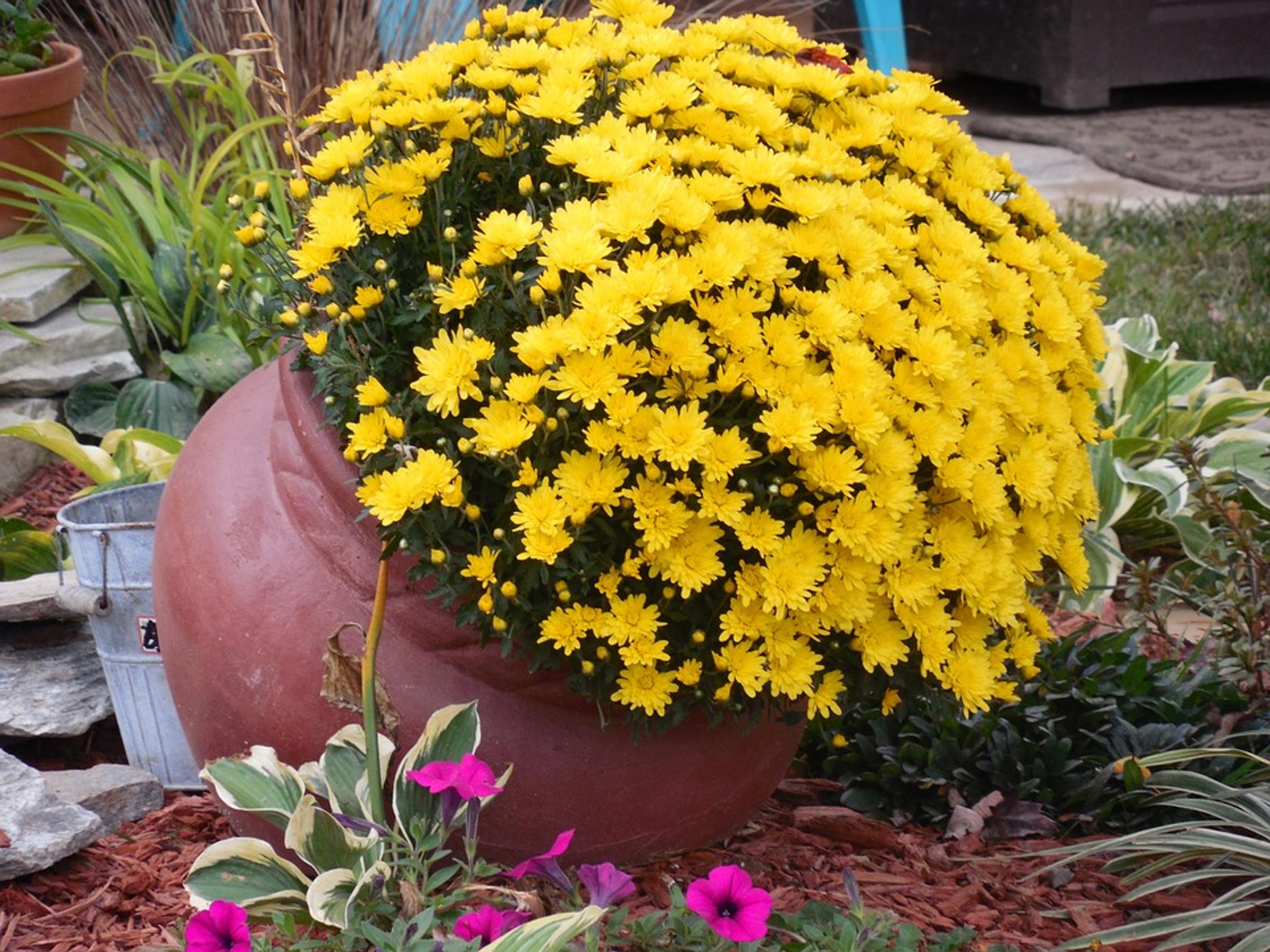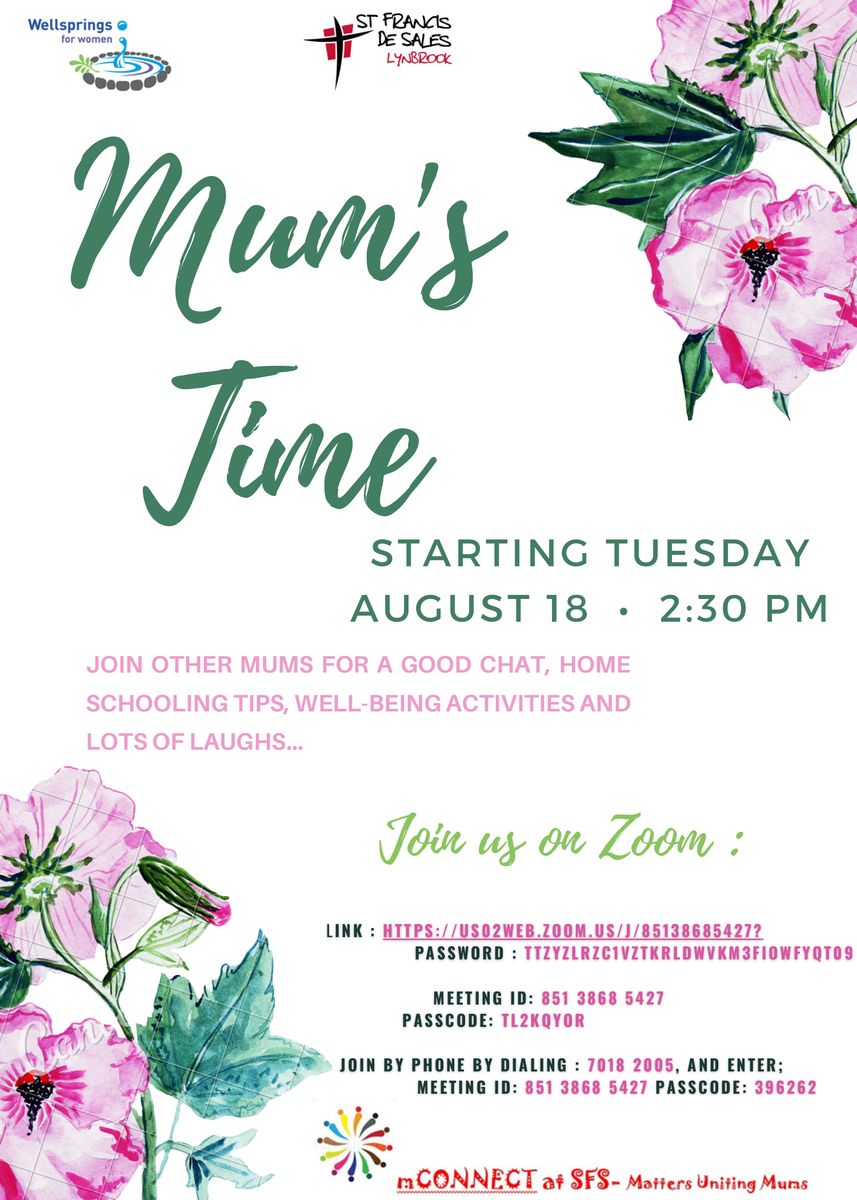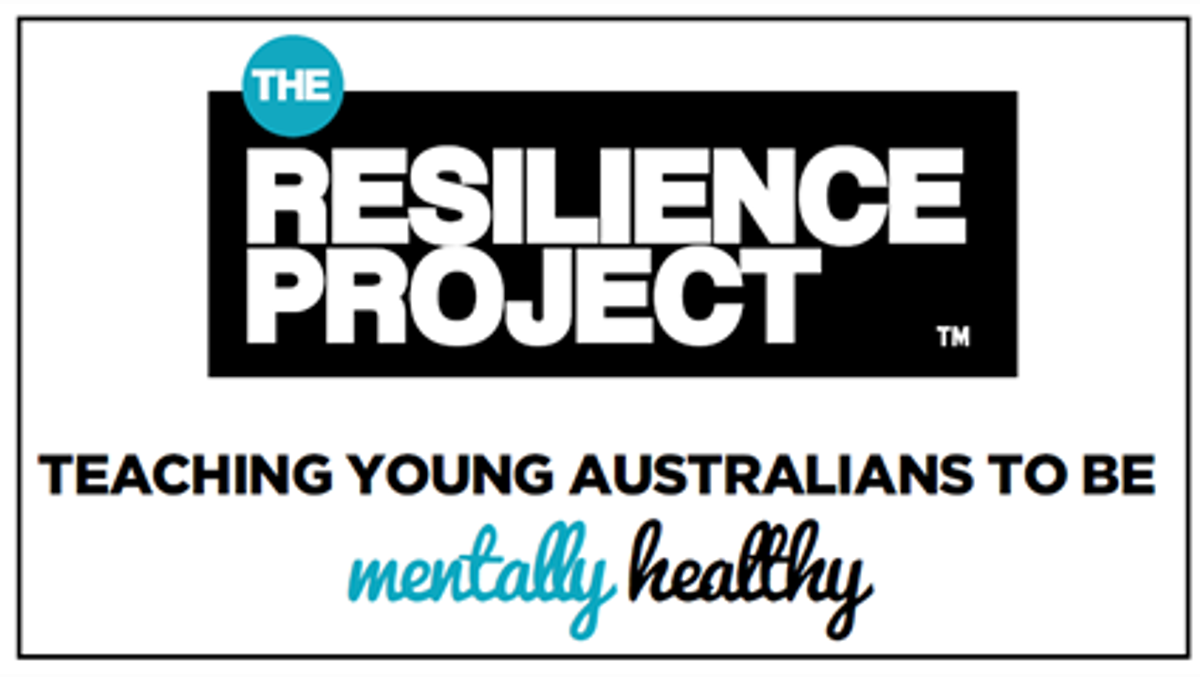Wellbeing

mConnect with Wellsprings for Women
mConnect is a group we came up with at SFS to help connect parents to the school and each other.
It is organised in conjunction with Wellsprings for Women, an organisation based in Dandenong.
Last year we had quite a few free workshops on offer which included henna tattoos, massage, Bollywood dancing, an inspirational talk, cake decorating and a celebration of food and cultures. We also organised excursions in the holidays for parents to attend with their children including a trip the Museum, the NGV and Fed Square and Casey Safety village. Unfortunately due to Covid19, all our plans have been put on hold for 2020, but there has never been a more important time for us to connect.
We are pleased to tell you that starting from next week, Robyn from Wellsprings will be running a weekly virtual catch up and workshop. This will run every Tuesday afternoon from 2.30 to 3.15pm. All are most welcome to join in. See the flier below with details of how to join the meeting via ZOOM. Please RSVP to Rachel Lenko at rlenko@sfslynbrook.catholic.edu.au if you are attending the ZOOM afternoon.
The topic for our first meeting will be “Tips on remote learning with your children”. We would love parents input, so if there is a particular topic you would like to discuss or skill you would like to learn, please come along and share your ideas. This is a wonderful opportunity for parents to connect with other parents and to the school, express their ideas, talk to others and have some fun.
Meeting ID: 851 3868 5427
Passcode: TL2Kqy
Protective Behaviours
Continuing on from last week’s newsletter, we looked at the early warning signs that our body tells us that we are in danger. This week we are focusing on the strategy of one step removed. The following information is taken from a resource called A Parent’s guide to talking about Safety by Chidwise.
Children often enjoy being taught protective behaviours. One useful tool is the ‘one step removed’ scenarios. These make it easier for children to engage with the idea of safety by thinking about what someone else would do. For instance, instead of ‘what would you do if…’, saying ‘what could someone do when…’. This is likely to limit the chances of distressing a child by placing them into the situation directly.
• Consider what you want to talk about - You don’t have to go through all the information in one sitting - doing it over a few weeks will help to reinforce the message. Keep it fun!
• Learn about the issue yourself - Know what the signs, indicators and impacts of child abuse and trauma are. That way, if your child seems distressed, you’ll be better placed to identify it.
• Seek advice - You don’t have to do it alone, You can call and speak to one of the Child Wise experts, or find additional information online. It is important that you use the correct language when talking to your child. If they hear you speak it, children are more likely to recognise it as part of every day life.
18 months to 3 years: Begin to teach the correct names for all the body parts.
3 to 5 years: Teach about private body parts, early warning signs, and how it is ok to say no to someone who touches you and makes you feel uncomfortable.
5 to 8 years: Talk about the different types of touch and the safety continuum.
BeYou is a resource for educators that promotes the mental health of all members of the school community. This week’s fact sheet from the website is all about recognising anxiety in children and what you can do to help your child.
Anxiety can be difficult to spot because it presents in many ways. The important point is to notice that there’s a concern and seek further advice and assistance.
For children and young people whose anxiety is less severe, social and emotional learning (SEL) programs that build resilience and coping strategies can be very helpful. These can be embedded as part of a whole-learning community approach. Read more about common signs and symptoms of anxiety in children and young people. On an individual level, there are also many helpful ways you can support children and young people experiencing anxiety, depending on their developmental stage. Here are some ideas:
• Give young children the language to label how they’re feeling, so they can learn to identify their emotions (for example, say, “It looks like you might be feeling a bit worried. Sometimes when I feel worried, my tummy feels wobbly”).
• Give notice prior to transitions like starting or stopping activities or moving rooms to help children and young people prepare for change.
• Support families to develop consistent ‘goodbye’ routines for younger children at drop-off, to create a sense of predictability.
• Help children and young people understand that being anxious, particularly when confronting new situations, is normal, but also that there are strategies for managing anxious feelings.
• Help individuals recognise their own internal cues that they’re becoming anxious (for example, if they have a racing heart or are unable to think, identify and practice strategies that help them to manage their anxiety and calm down).
• Use a step-by-step approach. Break tasks down into small manageable chunks, moving up a step when an individual can cope without anxiety (for example, presenting a project to an educator, presenting a project to an educator and two friends, presenting a project to a small group, and so on).
- Help children and young people recall situations where they’ve succeeded despite being anxious, to strengthen their self-belief they can cope with and manage their anxiety.
• Help them understand that avoiding those things that make them anxious, while useful as a short term fix, is likely to make things harder in the future.
• Encourage children and young people to have a go at things that are new and to understand that it takes time to learn new skills or behaviours.
• Help them to recognise their own self-talk when approaching new situations and to develop some positive coping statements to stop the self defeating talk.
• Set realistic expectations for challenges and assist children and young people to manage stress associated with tasks.
• Talk about effective and helpful strategies that you use to manage anxiety or stress (for example, talking to friends, positive self-talk, exercise and other relaxation strategies).
• Enlist the support of important people in their lives such as family members, peers and others.
The Resilience Project
GEM TV is a 10 to 15 minute online program for children run by Martin from the Resilience Project covering the key principals of Gratitude, Empathy, Mindfulness and Emotional Literacy. TRP have made each GEM TV episode available to allow you and your families to catch up and rewatch your favourite episodes. Click the link below and scroll down to find the episode you're after.
Catch Up on all your favourite episodes now!
Season 1 of GEM TV will run daily at 11am until the19th of August. We will share more details about season 2 in the coming weeks.
Covid 19 Resources
Here are some more resources you might find useful. This week’s resources are all about safety online, which is so important at the moment with children spending so much time online.
This one offers some tips on how to stay safe online during the Covid 19 pandamic.
https://www.esafety.gov.au/about-us/blog/covid-19-online-safety-kit-for-parents-and-carers
This is a poster with the top 5 online safety tips for kids.
https://www.esafety.gov.au/sites/default/files/2020-03/eSafety_Ed%20Kids%20TT%20Poster.pdf
These question cards are designed to be used in a family or education setting to start everyday conversations about online safety. The cards cover topics such as identifying online risks, using technology safely and reporting unsafe behaviour
https://www.esafety.gov.au/sites/default/files/2020-03/eSafety_Ed%20Conversation%20S%20%20Kids.pdf
You and the family might like to try the family online safety challenge.
https://www.thinkuknow.org.au/sites/default/files/2020-04/7-day-family-online-safety-challenge.pdf
As always, if you have any concerns about the wellbeing of your child, please feel free to contact me rlenko@sfslynbrook.catholic.edu.au
Rachel Lenko
Student Wellbeing Leader



